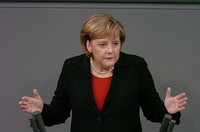Elections in Germany: CDU to Form "Grand Coalition" with SPD
Sunday Germans head to the polls to elect members who will form the country's 17th Bundestag.

Two candidates -- incumbent chancellor, Angela Merkel and her vice-chancellor and foreign minister Frank-Walter Steinmeier -- are vying to head up what has historically been a coalition government.
Merkel, leader of the Christian Democratic Union (CDU) party, is looking to secure her second term as German chancellor. Steinmeier is a member of the Social Democratic Party (SPD). Together the CDU and the SPD currently occupy over 60 percent of the seats in the German parliament, CNN.com reports.
It was also reported, voters remain skeptical of Angela Merkel's promises of tax cuts that she could be constrained in her choice of a coalition partner.
Merkel, head of the conservative Christian Democratic Union, or CDU, wants to break out of the "grand coalition" with the center-left Social Democratic Party, or SPD. They joined together in 2005 to form a government with the CDU's Bavarian sister party, the Christian Social Union.
Her apparent partner of choice in a new center-right coalition government would be the pro-business Free Democrats. That would recreate the political combination that ran Germany from 1983 to 1998, reunifying the country in 1990.
Merkel has promised post-election tax cuts, and the Free Democrats are standing on lower taxes and a longer lifespan for nuclear power plants. But economists said that Germany can't afford tax reductions after running up deep deficits during a year-long recession. Moreover, Merkel's grand coalition government imposed increases in value-added tax after taking power, and voters haven't forgotten, The Wall Street Journal reports.
One of the immediate challenges the new government will face is stimulating growth of Europe's biggest economy, which emerged from a deep recession in the second quarter. Economists warn a sustained recovery is far from assured, as temporary stimulus measures expire. These include incentives for new car purchases, and a government-subsidised scheme to help firms retain workers on reduced hours. In particular, the government will need to keep unemployment from surging.
At the same time, it is under pressure to consolidate a ballooning budget deficit, forecast to swell to as much as 6 percent of gross domestic product next year. This raises the prospect of a row between pro-growth advocates who want tax relief, and those who want to rein in the deficit via spending cuts and/or higher taxes, Reuters reports.
Subscribe to Pravda.Ru Telegram channel, Facebook, RSS!




